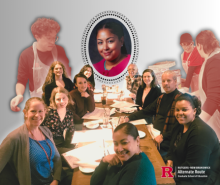New Jersey Alternate Route Teachers Challenge Conventional Employment, STEM & Diversity Pathways
People of all backgrounds, ages, and educational levels are choosing alternate route teacher training programs to launch successful careers in teaching and education. Each year, the Rutgers Center for Effective School Practices’ Alternate Route Program surveys our graduates to check in on their career transition and program satisfaction.
This year’s survey makes two things clear. Rutgers Alternate Route is especially inclusive of everyone with the desire to teach. What’s more, candidates are leaving our program with the professional competencies and professional development skills needed to excel as teachers and educators. Our findings challenge many misconceptions of who the typical alternate route candidate is and where their teaching career can take them.
Here are the top 3 barriers and misconceptions Rutgers Alternate Route teachers are dismantling.
MYTH 1: Top Performing Schools Don’t Hire Alternate Route Teachers
There is a misconception that alternate route teachers are at a disadvantage when applying for full time positions at top performing New Jersey schools.
From the most recent cohort of teachers certified through Rutgers Alternate Route, seven percent are teaching at NJ school districts ranking in the top 25 percentile, and twelve percent are teaching with high performing districts in the top 50 percentile. Almost ten percent of Rutgers Alternate Route candidates are teaching in private K-12 schools, while twenty percent accepted teaching positions at charter schools. An almost equal number of Rutgers Alternate Route graduates are teaching in suburban (54%) and urban (46%) public schools.
MYTH 2: Alternate Route Teachers Aren’t Diverse
As K-12 classrooms have grown in diversity, the need to expand the pool of multicultural Americans entering into the teaching profession has become more pressing. Students of color make up almost half of the public school population, and yet, according to a 2014 report from the Center for American Progress, teachers of color comprise just 18 percent of the teaching profession.
The Rutgers Alternate Route Program has long been a strong proponent of diversity and inclusion, and our cohort demographics reflect this. Compared to the national rate of teachers of color, our program is doubling the pipeline of multicultural Americans entering the teaching force. Thirty six percent of Rutgers Alternate Route candidates are candidates of diverse backgrounds. The percentage of Latin and Asian Americans in our program is significantly higher than most recent U.S. Census population data.
MYTH 3: Alternate Route Isn’t Suitable For Mature Career Changers
Alternate Route teacher certification programs enable Americans of all ages to pursue teaching as a second, third, or even fourth career. While Millennials make up just under half of our program, more than 30 percent of candidates training to become teachers with Rutgers Alternate Route are born in the 1950s and 60s. Just goes to show you’re never too old to make a career change.

 Heather Ngoma has over 25 years of experience collaborating with educators across New Jersey to drive education innovation. She currently serves as the Director of the Rutgers-GSE Alternate Route Program in the Department of Learning and Teaching, a program which helps career changers, recent college graduates, and other aspiring education professionals become licensed teachers in New Jersey. Follow her on Twitter @heatherngoma.
Heather Ngoma has over 25 years of experience collaborating with educators across New Jersey to drive education innovation. She currently serves as the Director of the Rutgers-GSE Alternate Route Program in the Department of Learning and Teaching, a program which helps career changers, recent college graduates, and other aspiring education professionals become licensed teachers in New Jersey. Follow her on Twitter @heatherngoma.





